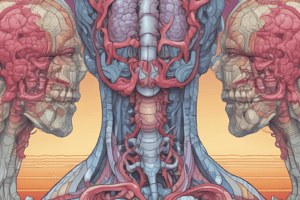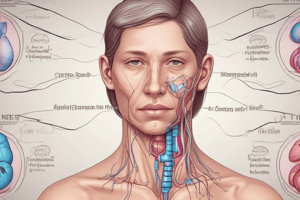Podcast
Questions and Answers
What is the typical weight of the thyroid gland?
What is the typical weight of the thyroid gland?
- 20-60 grams (correct)
- 100-150 grams
- 10-20 grams
- 60-100 grams
What is the primary function of the thyroid gland?
What is the primary function of the thyroid gland?
- To filter blood
- To synthesize and release hormones (correct)
- To store energy
- To regulate body temperature
What role do thyroid hormones play in growth and development?
What role do thyroid hormones play in growth and development?
- They slow down growth and development
- They promote growth and development in young individuals (correct)
- They cause muscle atrophy
- They have no effect on growth and development
What is the effect of thyroid hormones on the body's basal metabolic rate (BMR)?
What is the effect of thyroid hormones on the body's basal metabolic rate (BMR)?
What is the primary function of the thyroid gland in the body?
What is the primary function of the thyroid gland in the body?
What is the name of the narrow strip of tissue that connects the two lobes of the thyroid gland?
What is the name of the narrow strip of tissue that connects the two lobes of the thyroid gland?
What is the result of an underactive thyroid gland?
What is the result of an underactive thyroid gland?
What is the role of thyroid hormones in fetal development?
What is the role of thyroid hormones in fetal development?
What is the name of the disease that is characterized by the presence of antithyroglobulin and antithyroid peroxidase antibodies?
What is the name of the disease that is characterized by the presence of antithyroglobulin and antithyroid peroxidase antibodies?
What is the type of feedback loop that regulates the production and release of thyroid hormones?
What is the type of feedback loop that regulates the production and release of thyroid hormones?
Who is most commonly affected by Hashimoto's thyroiditis?
Who is most commonly affected by Hashimoto's thyroiditis?
What is the outcome of an imbalance in thyroid hormones in the body?
What is the outcome of an imbalance in thyroid hormones in the body?
Flashcards are hidden until you start studying
Study Notes
The thyroid gland is a small, butterfly-shaped organ located at the front of the neck, beneath the skin. It is part of the endocrine system and plays a vital role in controlling many of the body's important functions by producing and releasing hormones. The thyroid gland consists of two lobes, connected by a narrow strip of tissue called the isthmus, and it weighs between 20 and 60 grams on average.
Function and Hormones
The primary function of the thyroid gland is to synthesize and release hormones, predominantly tetraiodothyronine (T4) and triiodothyronine (T3). These hormones are iodine-rich and play a crucial role in regulating the body's metabolism, growth, and development. They help regulate chemical reactions in the body, aid in growth and development, and help regulate many body functions by constantly releasing a certain amount of thyroid hormones into the bloodstream.
Role in Metabolism and Growth
Thyroid hormones increase the body's basal metabolic rate (BMR), raising body temperature, stimulating gluconeogenesis (the production of glucose from non-carbohydrate sources), lipolysis (the breakdown of fats), and proteolysis (the breakdown of proteins). They also increase glucose absorption and promote growth in young individuals, leading to bone maturation and fusion of growth plates. They are essential for central nervous system (CNS) maturation during fetal development.
Regulation and Feedback Mechanisms
The production and release of thyroid hormones are controlled by a negative feedback loop. When the body needs more energy, the thyroid gland produces more hormones, and when the body has enough energy, the thyroid gland releases less hormone. This delicate system allows for the maintenance of a relatively steady thyroid state in the normal individual.
Thyroid Diseases
Abnormalities in the thyroid gland can lead to hypothyroidism (underactive thyroid) or hyperthyroidism (overactive thyroid). Hypothyroidism can be caused by diseases such as Hashimoto's thyroiditis, which is characterized by the presence of antithyroglobulin and antithyroid peroxidase antibodies. Hashimoto's thyroiditis usually presents as a painless, slowly enlarging gland, often resulting in hypothyroidism. It is most common in middle-aged women and may cluster in families.
Conclusion
The thyroid gland is a vital organ that plays a crucial role in controlling many body functions through the production and release of hormones. Its proper functioning is essential for maintaining the body's metabolic rate, growth, and development. Any abnormalities in the thyroid gland can lead to hormonal imbalances, resulting in hypothyroidism or hyperthyroidism, which can have significant impacts on an individual's health and quality of life.
Studying That Suits You
Use AI to generate personalized quizzes and flashcards to suit your learning preferences.




